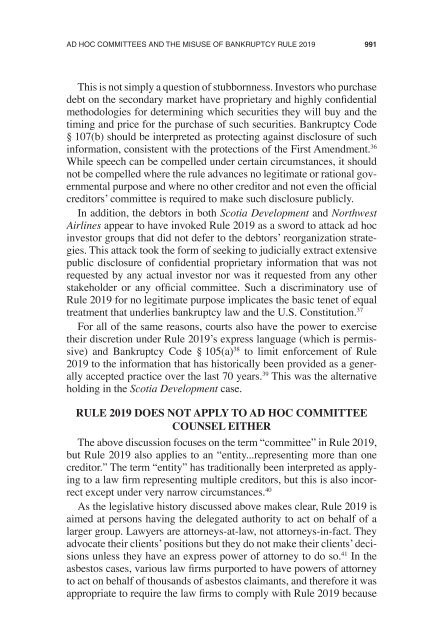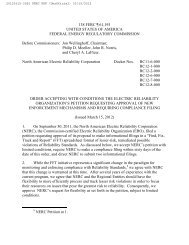Ad Hoc Committees and the Misuse of Bankruptcy Rule 2019
Ad Hoc Committees and the Misuse of Bankruptcy Rule 2019
Ad Hoc Committees and the Misuse of Bankruptcy Rule 2019
You also want an ePaper? Increase the reach of your titles
YUMPU automatically turns print PDFs into web optimized ePapers that Google loves.
<strong>Ad</strong> <strong>Hoc</strong> <strong>Committees</strong> <strong>and</strong> <strong>the</strong> <strong>Misuse</strong> <strong>of</strong> <strong>Bankruptcy</strong> <strong>Rule</strong> <strong>2019</strong> 991<br />
This is not simply a question <strong>of</strong> stubbornness. Investors who purchase<br />
debt on <strong>the</strong> secondary market have proprietary <strong>and</strong> highly confidential<br />
methodologies for determining which securities <strong>the</strong>y will buy <strong>and</strong> <strong>the</strong><br />
timing <strong>and</strong> price for <strong>the</strong> purchase <strong>of</strong> such securities. <strong>Bankruptcy</strong> Code<br />
§ 107(b) should be interpreted as protecting against disclosure <strong>of</strong> such<br />
information, consistent with <strong>the</strong> protections <strong>of</strong> <strong>the</strong> First Amendment. 36<br />
While speech can be compelled under certain circumstances, it should<br />
not be compelled where <strong>the</strong> rule advances no legitimate or rational governmental<br />
purpose <strong>and</strong> where no o<strong>the</strong>r creditor <strong>and</strong> not even <strong>the</strong> <strong>of</strong>ficial<br />
creditors’ committee is required to make such disclosure publicly.<br />
In addition, <strong>the</strong> debtors in both Scotia Development <strong>and</strong> Northwest<br />
Airlines appear to have invoked <strong>Rule</strong> <strong>2019</strong> as a sword to attack ad hoc<br />
investor groups that did not defer to <strong>the</strong> debtors’ reorganization strategies.<br />
This attack took <strong>the</strong> form <strong>of</strong> seeking to judicially extract extensive<br />
public disclosure <strong>of</strong> confidential proprietary information that was not<br />
requested by any actual investor nor was it requested from any o<strong>the</strong>r<br />
stakeholder or any <strong>of</strong>ficial committee. Such a discriminatory use <strong>of</strong><br />
<strong>Rule</strong> <strong>2019</strong> for no legitimate purpose implicates <strong>the</strong> basic tenet <strong>of</strong> equal<br />
treatment that underlies bankruptcy law <strong>and</strong> <strong>the</strong> U.S. Constitution. 37<br />
For all <strong>of</strong> <strong>the</strong> same reasons, courts also have <strong>the</strong> power to exercise<br />
<strong>the</strong>ir discretion under <strong>Rule</strong> <strong>2019</strong>’s express language (which is permissive)<br />
<strong>and</strong> <strong>Bankruptcy</strong> Code § 105(a) 38 to limit enforcement <strong>of</strong> <strong>Rule</strong><br />
<strong>2019</strong> to <strong>the</strong> information that has historically been provided as a generally<br />
accepted practice over <strong>the</strong> last 70 years. 39 This was <strong>the</strong> alternative<br />
holding in <strong>the</strong> Scotia Development case.<br />
RULE <strong>2019</strong> DOES NOT APPLY TO AD HOC COMMITTEE<br />
COUNSEL EITHER<br />
The above discussion focuses on <strong>the</strong> term “committee” in <strong>Rule</strong> <strong>2019</strong>,<br />
but <strong>Rule</strong> <strong>2019</strong> also applies to an “entity...representing more than one<br />
creditor.” The term “entity” has traditionally been interpreted as applying<br />
to a law firm representing multiple creditors, but this is also incorrect<br />
except under very narrow circumstances. 40<br />
As <strong>the</strong> legislative history discussed above makes clear, <strong>Rule</strong> <strong>2019</strong> is<br />
aimed at persons having <strong>the</strong> delegated authority to act on behalf <strong>of</strong> a<br />
larger group. Lawyers are attorneys-at-law, not attorneys-in-fact. They<br />
advocate <strong>the</strong>ir clients’ positions but <strong>the</strong>y do not make <strong>the</strong>ir clients’ decisions<br />
unless <strong>the</strong>y have an express power <strong>of</strong> attorney to do so. 41 In <strong>the</strong><br />
asbestos cases, various law firms purported to have powers <strong>of</strong> attorney<br />
to act on behalf <strong>of</strong> thous<strong>and</strong>s <strong>of</strong> asbestos claimants, <strong>and</strong> <strong>the</strong>refore it was<br />
appropriate to require <strong>the</strong> law firms to comply with <strong>Rule</strong> <strong>2019</strong> because



